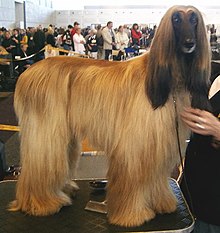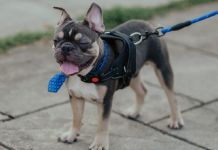
It’s indeed true! Decreased dander, comparatively small shedding, and not that big on a drools scale—and it’s a great hypoallergenic pet!
Civilized and graceful, the Afghan breed is a caring and self-reliant pup, readily recognized by its own remarkably lengthy and velvety hair.
It’s the real eye-catching fur that deters multiple aspiring allergic reaction pet owners into contemplating an Afghan—which is a terrible shame.
Also Read: Scratch Dog or Not – Are Airedale Terrier Dogs Hypoallergenic?
The fact is, these are incredibly hypoallergenic.
The above beautiful dog breed has scarcely been shed or anything like that. And there would undoubtedly be some hair loss—it requires regular maintenance, and it’s surprisingly consistent. Practically speaking, mature Afghan Hounds lose their fur per spring and autumn, whereas unpaid girlie dogs lose their hair each season.
Well, if you already have an Afghan bitch, it is indeed a smart idea to always have her ‘finished’ as quickly as possible.
Interestingly, unlike all other breeds, including the Alaskan Husky, the Afghans don’t have a heavy inner fur lining that could otherwise trigger seasonal allergies. Dander amounts are low—the bulk of sensitive skin and decaying hair is trapped in the fur, not much on your carpeting.
Characteristics and Coat of Afghan Hound
Many observers link an Afghan Hound mostly as a fashion icon of its dog community. It is mainly because of its luscious locks, graceful body shape, and observing every outside saunter as something of a catwalk display.
Genuinely, I believe it’s a whole lot of rubbish. The Afghan is just too sophisticated to be connected with these kinds of meaningless crap.
Notable hip bones and large foot pads—both functioning as a suspension system to support them track down Afghanistan’s mountainous areas, cutting off an intense and intimidating figure. Merge this body structure with a 28-inch shoulder level; you’ve got a major elegant pup.
Although, he understands that he’s been a level just above peasant class.
The static Afghan would proudly stand, keeping his enlarged head up high. It’s going to look motionlessly into another middle of the group, including its almond-shaped eye sockets, a participant of the landed aristocracy observing the properties.
The fur is too dense, and the velvety, fluid surface offers a sense of softness. Though wonderful to stare at, the real fur always functioned as vital security in the harsh environment of Afghanistan’s land.
Together with all Afghans, aside from their faces, they are coated in this hair, including their legs and large earlobes.
A Simple Yet Important Advice – Afghan Hound
When you’re dreaming about buying a hypoallergenic Afghan, perceive this—not it’s a small pup. If you’re searching for a far more lightweight breed, keep reading for better miniature hypoallergenic breeds.
Usually, the Afghan Hound height is about 25-28 inches on the shoulders, weighing about 50-60 pounds.
About Afghan Hound Temperament
However, with its royal presence, most Afghans may often exhibit symptoms of becoming slightly well behaved.
That being said, it is the entire world temperament that makes them the top choice of the Afghan admirers. These were not poodles, or obsequious monsters are independent and strong personalities.
As being among the best-known breeds recognized, their origins have changed much since about the times of their ancestor’s wolf. As a result, these have a tremendous hunting instinct and therefore do not interact well with the other domestic animals. So, the primary meaning of the Afghan hound is for hunting.
It is essential to maintain them on something like a harness just outside of the house. Whenever they see the activity of what they deem to be a possible target, they may enter the chase mode, keeping you stationary.
Ways to Groom and Care an Afghan Hound
• Managing Their Velvety Coat
There is no denying that Afghan Hounds are beautiful dogs. As a puppy, you’ve got a bit to think about.
Afghan puppies wear short and fluffy layers of fur, frequently with oddly cute facial hair, regarded as ‘monkey hairs.’ Strictly speaking, they need relatively minimal care as youths.
The magnificent velvet and long fur across both teenage and adolescent Afghans make a big difference in cleaning. Since you’re not able to get a couple of hours of grooming and scrubbing per week, these pups won’t be your perfect companion.
Dense hair is vulnerable to knotting and twist until you offer this one a nice ride nearly every day. Remember to take the brush back to their skin to fix the inner lining. Also, you’ll have to work mostly on places around your thighs, including under your belly.
Being a dog who has to walk regularly, the hair functions as a magnet for mud and contaminants from the walks. For this problem, grooming, along with daily showering with shampooing, is necessary.
Important Information Related Afghan Hound’s Health Issues
An average life span of an afghan hound is around 12 years. The common causes of death are:
- • Old age (approx. 20.3 %)
- • Cancer (approx. 30.8 %)
- • Heart Failure (approx. 10.5 %)
These are the common health issues most Afghan hound suffers. It is somehow common are more when compared with other breeds.
Some other health issues include:
• Chylothorax
During this disorder, the thoracic duct system dissipates fluids to the circulatory system of the pup. The excessive force allows the pet’s lungs to wrap, triggering severe respiratory issues.
Also Read: Scratch Dog or Not – Are Havanese Hypoallergenic?
So, if you’re going to see your pup has complications holding his breath, a heavy chest, or odd crackling noises—take the doctor right away. Although severe, Afghans have a quick recovery potential if they are diagnosed early.
• Hip Dysplasia
Commonly due to the femur’s ball (thigh bone) or even hip joint do not develop at the same rate—meaning that its injured leg somehow doesn’t fit entirely into the tendon condition identified as hip dysplasia.
If you’re addressing that your Afghan has a habit of running or stroll, or a noticeable ‘bunny-hopping’ style, communicate to your physician. Although hip dysplasia is identified, treatment, dietary therapy, regular exercise, or surgery may be suggested.
• Bloat
Like other deep-chested doggies, Afghans can exhibit GDV (gastric dilation-volvulus), sometimes defined as a warped belly or bloat.
The above disease occurs all of a moment and therefore can damage a completely healthy Afghan. While the exact cause is not clear, it sometimes occurs after eating a big meal or consuming a large quantity of water shortly after intense physical activity.
Final Words
The Afghan is probably much more traditional among all different breeds, and he acknowledges that. This distinctly aristocratic pup has a quality of beauty and integrity, characterized by its beautiful coat, lifted head, and majestic stance.
Inclined to chase and a vigilant walker, this is the perfect pup for all animal owners who would like to appreciate the beautiful outdoor activities for their furry friend, with absolutely no shedding, low dander, and little to no drooling. The Afghan Hound hypoallergenic pet does not prefer any intolerances.
Frequently Asked Questions About Afghan Hound
• Is there any shedding issue with Afghan Hound?
No, there is no major shedding issue with the Afghan Hound. In simple words, the bread comes with minimum to no shedding volume. However, you have to maintain their long hair once a year. Just offer them a trim.
• Do all breeds of Afghan Hound come with long hair?
Yes, all breeds of Afghan Hound come with long hair.
• Is it good to adopt an Afghan hound as a family pet dog?
Yes, it is perfect to adopt an Afghan hound as a family pet dog.









